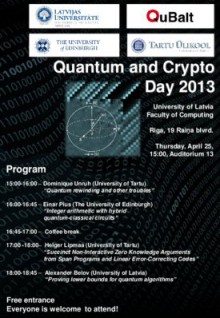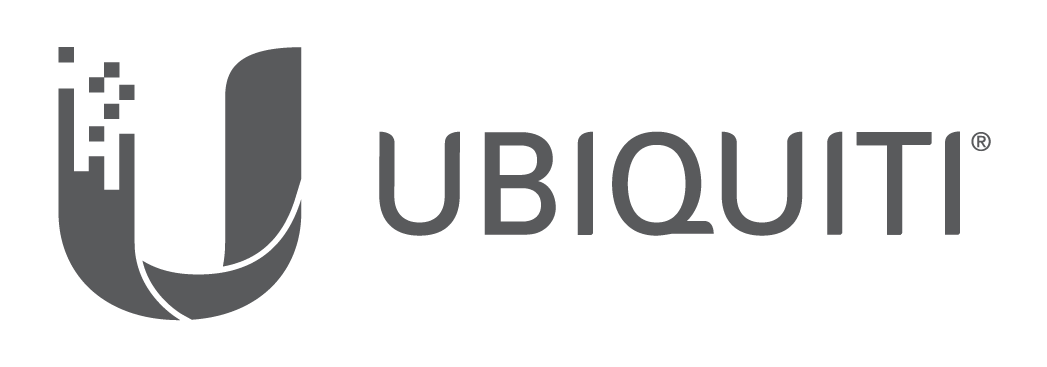
Ceturtdien, 25. aprīlī, no plkst. 15:00 līdz 19:00 LU Datorikas fakultātē (Raiņa bulv. 19, 3.stāvā, 13. auditorijā) ar SIA “QuBalt” atbalstu notiks “Kvantu un kripto diena 2013”. Jau trešo gadu LU DF pulcēsies kriptogrāfijas un kvantu pētnieki, lai apspriestu jaunākas tendences kvantu skaitļošanā un modernajā kriptogrāfijā. Pasākums būs skatāms arī tiešraidē LU portālā www.lu.lv/tiesraide. Aicināti visi interesenti!
Šogad „Kvantu un kripto dienas” ietvaros referātus nolasīs lektori no Latvijas, Igaunijas un arī Lielbritānijas
Pasākuma programma:
15:00-16:00 Dominique Unruh (Tartu Universitāte) referāts “Quantum rewinding and other troubles”,
One is often tempted to think that a classical protocol is quantum secure, as long as it is based on quantum secure hardness assumptions (e.g., lattice based cryptography). Unfortunately, this is not always the case – classical proof techniques often break down in a quantum setting. Especially when rewinding comes into play, things get difficult. The best known example for these difficulties are zero-knowledge proofs.
16:00-16:45 Einar Pius (Edinburgas Universitāte) referāts “Integer arithmetic with hybrid quantum-classical circuits”,
Quantum circuits which perform integer arithmetic could potentially outperform their classical counterparts. A quantum circuit is considered which performs a specific computational pattern on classically represented integers to accelerate the computation. Such a hybrid circuit could be embedded in a conventional computer architecture as a quantum device or accelerator. In particular, a quantum multiply-add circuit (QMAC) using a Quantum Fourier Transform (QFT) is proposed which can perform the calculation on conventional integers faster than its conventional counterpart. Whereas classically applying a multiply-adder (MAC) on k bit integers n times sequentially would require O(n log k) parallel steps, the hybrid QMAC needs only O(n + k).
16:45-17:00 – Kafijas pauze
17:00 -18:00- Helger Lipmaa (Tartu Universitāte) referāts “Succinct Non-Interactive Zero Knowledge Arguments from Span Programs and Linear Error-Correcting Codes”,
Recently, Gennaro, Gentry, Parno and Raykova [GGPR12] proposed an ecient non-interactive zero knowledge argument for Circuit-SAT, based on non-standard notions like conscientious and quadratic span programs. We propose a new non-interactive zero knowledge argument, based on a simple combination of standard span programs (that verify the correctness of every individual gate) and high-distance linear error-correcting codes (that check the consistency of wire assignments). We simplify all steps of the argument. As one of the corollaries, we design an (optimal) wire checker, based on systematic Reed-Solomon codes, of size 8n and degree 4n, while the wire checker from [GGPR12] has size 24n and degree 76n, where n is the circuit size. Importantly, the new argument has constant verier’s computation.
(publikācija: http://eprint.iacr.org/2013/121)
18:00-18:45 – Aleksandrs Belovs (Latvijas Universitāte) referāts “Proving lower bounds for quantum algorithms”.
Proving lower bounds on the query complexity of computational problems is one of the main ways to demonstrate limitations of quantum computation. In this talk, I serve some recent advances in proving lower bounds using the adversary method.
Ieeja pasākumā ir bez maksas. Pasākums notiks angļu valodā.






Plakātam tāds patīkams izmērs. Kā reiz perfekts manai acij.
Pārpublicēts, no http://www.df.lu.lv. Centīšos labot šo radušos kļūmi!